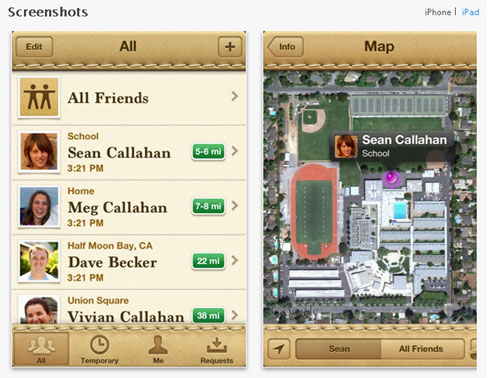Beware of geeks bearing gifts.
A man in New York City has reportedly caught his wife cheating using the Find My Friends app of the iPhone 4S he gave her.
Find My Friends uses global positioning system (GPS) to let people share their locations with friends. The locations of people are indicated by a tooltip on a satellite map. And since the app uses GPS, the locations are accurate up to several meters.
According to a post in a Mac website message board, a New York City man bought his wife a new iPhone 4S and installed Find My Friends without informing her. He said he had suspicions his wife was meeting a man who lived uptown. His suspicion was confirmed by Find My Friends, who showed her there. He then texted her to ask where she was and she answered that she was with friends in a completely different location.
He said he would be using the data he gathered to divorce his wife. “Thankfully, she’s the rich one,” he said.
There is no definite confirmation of the incident but the post shows the extent of location data gathered by consumer devices like smartphones.

GPS is a navigation system developed by the US Department of Defense. It uses a network of satellites to give position data accurate to a few meters.
Even gadgets for civilian uses have accuracies that were once unthinkable. A Garmin GPS watch, for example, draws a zigzag to represent the position readings when you go up the stair in the Marcelo Fernan Bridge. That’s how accurate its readings are.
That is the same system that tracks location in today’s smartphones.
Location services for phones are nothing new. Several years back, telcos used to offer person finder services using triangulation via cellphone towers to determine location. But the accuracy of this system is nothing like that of GPS.
When I tested that setup in a column in 2007, the system said I was in Sacred Heart Parish when I was, in fact, standing right in front of Cebu City’s red light district in Kamagayan.
With GPS, however, you will have pinpoint accuracy. Location sharing services like Find My Friends and Google Latitude in Android (which came up with the feature first) will show your location within a few meters. If you’re in Kamagayan, it will pinpoint you to the specific house in Kamagayan that you are in. If you’re in a motel when you’re supposed to be in church, boy are you in trouble.
But location privacy doesn’t seem to concern people as they used to, if the popularity of such services as Foursquare, Gowalla and Facebook check-ins are to be considered. Many people like to share locations with friends, mostly in the hope of meeting up if they are within distance.
That, however, can be dangerous. It is an invitation to be robbed, as the website Please Rob Me showed in 2010 (the site has since stopped displaying data).
Showing people where you are makes your house vulnerable to robbery, especially if location data for your house is also publicly available. This is the reason I only turn on my Garmin watch outside our subdivision during my runs — social sports tracking sites like Daily Mile can display your running route and show people where your house is if you turn on your GPS device in front of your home.
What’s worse is that in a country like the Philippines, especially in certain areas with problems on peace and order, location sharing can also be an invitation to kidnapping.
Max is a journalist and blogger based in Cebu. He has written and edited for such publications as The Freeman, The Independent Post, Today, Sun.Star Cebu, Cebu Daily News, Philstar Life, and Rappler.
He is also a mobile app and web developer and co-founded InnoPub Media with his wife Marlen.

Leave a Reply